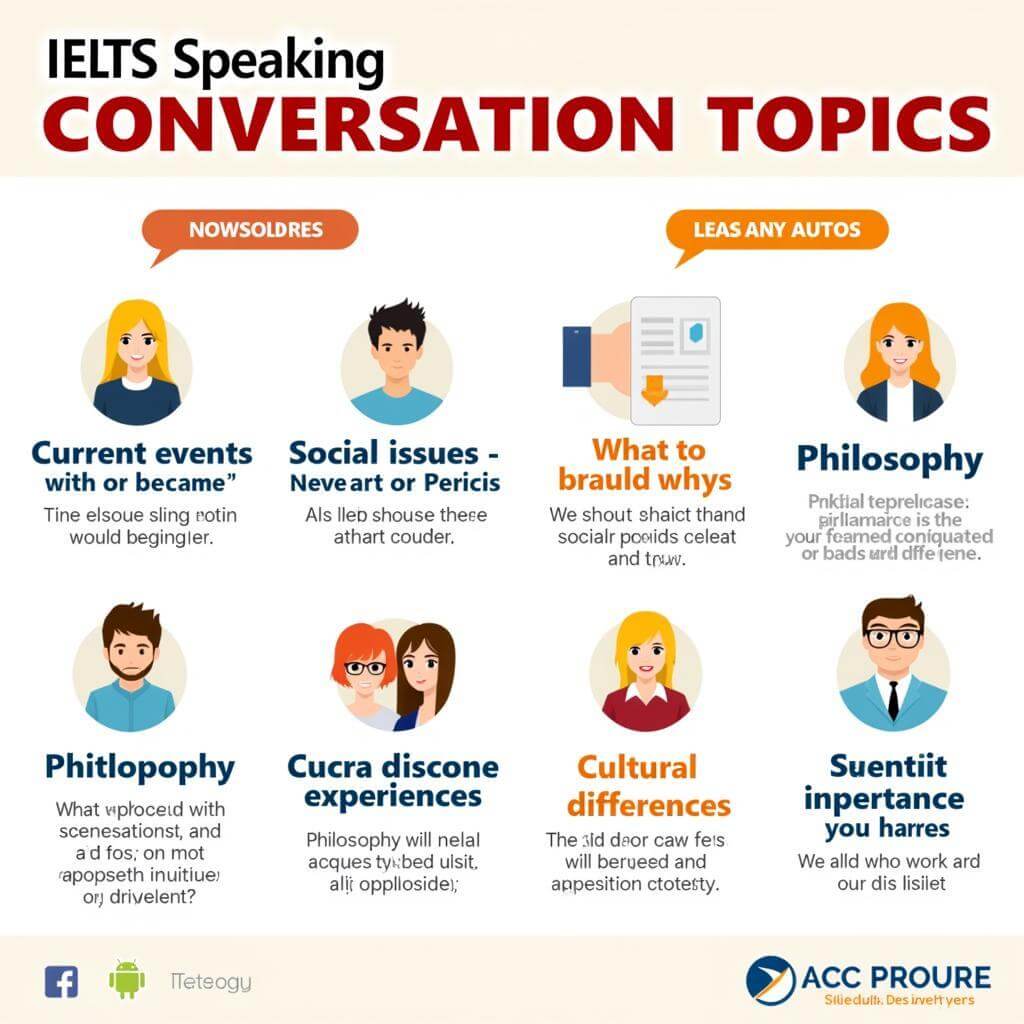The IELTS Speaking test often explores candidates’ personal experiences and their ability to articulate them fluently. One topic that frequently appears is describing a significant conversation that altered your viewpoint. This theme allows examiners to assess your language skills while gaining insight into your critical thinking and self-reflection abilities. Let’s dive into how you can excel in this topic across all parts of the IELTS Speaking test.
Part 1: Introduction and Interview
In this section, the examiner may ask general questions about conversations and communication. Here are some potential questions and sample answers:
- Do you enjoy having conversations with people?
Band 6-7 Answer:
Yes, I do enjoy talking to people. It’s a good way to learn new things and make friends. I especially like chatting with people who have different experiences from me.
Band 8-9 Answer:
Absolutely! I find conversations to be incredibly enriching experiences. They provide a unique opportunity to gain fresh perspectives and broaden my horizons. I particularly relish engaging in discussions with individuals from diverse backgrounds, as it allows me to challenge my own preconceptions and grow both intellectually and personally.
- What kinds of conversations do you find most interesting?
Band 6-7 Answer:
I find conversations about current events and social issues most interesting. They help me understand what’s happening in the world and how other people think about important topics.
Band 8-9 Answer:
I’m particularly drawn to conversations that delve into complex societal issues or explore philosophical concepts. These discussions not only keep me informed about global affairs but also challenge me to think critically and consider multiple viewpoints. I find that such conversations often lead to profound insights and can be truly transformative in shaping one’s worldview.
 IELTS Speaking Conversation Topics
IELTS Speaking Conversation Topics
Part 2: Long Turn
In this section, you’ll be given a cue card with a topic to speak about for 1-2 minutes. Here’s a sample cue card related to our theme:
Describe a conversation that changed your view on something
You should say:
- Who you had the conversation with
- Where and when the conversation took place
- What the conversation was about
- How it changed your view
Band 6-7 Sample Answer:
I’d like to talk about a conversation I had with my grandfather last summer. We were sitting in his garden one evening, and he started telling me about his experiences during World War II.
He told me about the hardships he faced and the friendships he made with people from different countries. Before this conversation, I had a very simplistic view of war based on what I’d seen in movies. I thought it was all about fighting and heroism.
But my grandfather’s stories showed me the human side of conflict. He talked about the fear, the loneliness, and the small acts of kindness that helped people survive. This really changed my perspective on war and made me realize how complex and devastating it can be.
After our talk, I started reading more about history and trying to understand different viewpoints on conflicts. It made me more interested in peace studies and international relations. I’m grateful for that conversation because it opened my eyes to a more nuanced view of the world.
Band 8-9 Sample Answer:
I’d like to recount a profound conversation I had with my grandfather last summer, which dramatically altered my perspective on war and human nature. We were ensconced in the tranquil setting of his garden one balmy evening when he began to share his poignant experiences from World War II.
Prior to this conversation, I had harbored a rather simplistic and romanticized view of war, largely informed by Hollywood portrayals that emphasized heroism and glory. However, my grandfather’s vivid recollections painted a starkly different picture, one that was far more nuanced and deeply human.
He spoke eloquently about the gut-wrenching fear that permeated daily life, the profound loneliness of being separated from loved ones, and the unexpected friendships forged across enemy lines. What struck me most was his emphasis on the small acts of kindness and shared humanity that emerged even in the darkest times.
This conversation was truly eye-opening, compelling me to reassess my preconceptions about conflict and human resilience. It ignited a passion for delving deeper into historical narratives and exploring multiple perspectives on global issues. I found myself drawn to peace studies and international relations, fields I had previously overlooked.
The impact of this conversation extends far beyond academic interest. It has instilled in me a deeper appreciation for the complexities of human experience and the importance of empathy in understanding different viewpoints. I’m immensely grateful for this exchange, as it has not only broadened my intellectual horizons but also fostered a more compassionate and nuanced worldview.
 Grandfather sharing war experiences
Grandfather sharing war experiences
Follow-up Questions:
- How often do you have conversations that change your views?
Band 6-7 Answer:
I don’t have such conversations very often, maybe once or twice a year. It usually happens when I meet someone with very different life experiences from mine.
Band 8-9 Answer:
While paradigm-shifting conversations are relatively rare, I find that I frequently engage in discussions that challenge and refine my perspectives. I actively seek out diverse viewpoints, whether through reading, attending lectures, or engaging with people from different backgrounds. This constant exposure to new ideas ensures that my worldview is continuously evolving, albeit often in subtle ways.
- Do you think it’s important to be open to changing your views?
Band 6-7 Answer:
Yes, I think it’s very important. The world is always changing, and we need to be able to adapt our ideas. Being open-minded helps us learn and grow as people.
Band 8-9 Answer:
Absolutely. I believe that intellectual flexibility is crucial in our rapidly evolving world. Being open to changing one’s views is a hallmark of critical thinking and emotional intelligence. It allows us to adapt to new information, bridge divides between different perspectives, and foster a more nuanced understanding of complex issues. This openness not only facilitates personal growth but also promotes social harmony and progress on a broader scale.
Part 3: Two-way Discussion
In this section, the examiner will ask more abstract questions related to the topic. Here are some potential questions and sample answers:
- How do you think technology has changed the way people communicate?
Band 6-7 Answer:
Technology has made communication much faster and easier. We can now talk to people all over the world instantly using smartphones and the internet. However, some people think it has made face-to-face communication less common, which might be a problem.
Band 8-9 Answer:
Technology has revolutionized communication in myriad ways. On one hand, it has democratized information sharing and enabled instant, global connectivity, fostering cross-cultural understanding and collaboration on an unprecedented scale. Social media platforms and messaging apps have created new forms of expression and community-building.
However, this technological shift is not without its drawbacks. The prevalence of digital communication has, in some cases, led to a decline in face-to-face interactions, potentially impacting our ability to read non-verbal cues and develop deep, meaningful relationships. Moreover, the instantaneous nature of digital communication can sometimes lead to hasty responses and misunderstandings.
Ultimately, while technology has undoubtedly expanded our communicative capabilities, it has also presented new challenges in maintaining the depth and quality of our interactions. The key lies in striking a balance, leveraging technology’s benefits while preserving the irreplaceable value of in-person dialogue.
- Do you think social media has made it easier or harder for people to change their views?
Band 6-7 Answer:
I think social media has made it both easier and harder. It’s easier because we can see many different opinions quickly. But it’s also harder because people often only follow others who agree with them, creating a “bubble” of similar ideas.
Band 8-9 Answer:
Social media’s impact on our ability to change views is profoundly paradoxical. On one hand, these platforms offer unprecedented access to diverse perspectives, potentially exposing us to ideas that challenge our existing beliefs. The ease of sharing information can facilitate rapid dissemination of new research and alternative viewpoints.
However, social media algorithms often create echo chambers or filter bubbles, where users are predominantly exposed to content that aligns with their existing views. This can lead to confirmation bias and polarization, making it harder for individuals to encounter and seriously consider opposing viewpoints.
Moreover, the brevity and speed of social media interactions can discourage nuanced discussion, favoring simplistic, often polarizing statements over thoughtful dialogue. The anonymity offered by some platforms can also lead to more extreme expressions of opinion, further entrenching existing beliefs.
Ultimately, while social media has the potential to broaden our perspectives, it requires active effort and digital literacy to use these platforms in a way that genuinely expands our worldviews rather than reinforcing existing biases.
 Social Media Echo Chambers
Social Media Echo Chambers
Key Vocabulary and Phrases for High Scores
To achieve a high score in IELTS Speaking, it’s crucial to use a range of sophisticated vocabulary and complex sentence structures. Here are some key terms and phrases that can elevate your responses:
-
Paradigm shift /ˈpærəˌdaɪm ʃɪft/ (noun): A fundamental change in approach or underlying assumptions.
Example: The conversation with my grandfather caused a paradigm shift in my understanding of war. -
Nuanced /ˈnjuːˌɑːnst/ (adjective): Characterized by subtle shades of meaning or expression.
Example: After our discussion, I developed a more nuanced view of the situation. -
To broaden one’s horizons (idiom): To expand the range of one’s knowledge, interests, or experiences.
Example: Engaging in conversations with people from diverse backgrounds helps broaden one’s horizons. -
To challenge preconceptions (phrase): To question or test previously held ideas or assumptions.
Example: The speaker’s personal anecdotes challenged my preconceptions about the immigrant experience. -
Transformative /trænsˈfɔːrmətɪv/ (adjective): Causing a marked change in someone or something.
Example: It was a transformative conversation that altered my career aspirations.
Remember to use these terms naturally and in appropriate contexts to demonstrate your language proficiency effectively.
You might also be interested in learning about how to describe an educational experience you had outside of school, which can complement your ability to discuss life-changing conversations.
Examiner’s Advice
To excel in the IELTS Speaking test, particularly when describing a conversation that changed your view:
-
Practice storytelling: Develop your ability to narrate events coherently and engagingly. Focus on structuring your response with a clear beginning, middle, and end.
-
Reflect deeply: Don’t just describe the conversation superficially. Analyze how and why it changed your perspective, demonstrating critical thinking skills.
-
Use a variety of tenses: When recounting past events and their ongoing impact, showcase your grammar skills by accurately using different tenses.
-
Incorporate idiomatic expressions: Naturally weave in idioms and colloquial phrases to demonstrate your familiarity with English.
-
Develop your ideas: Don’t just state your changed view; explain it, give examples, and discuss its implications to show depth of thought.
-
Stay relevant: Always keep the question in mind and ensure your response directly addresses all parts of the task.
Learn more about describing a favorite tradition in your family, another topic that can help you practice personal storytelling for the IELTS Speaking test.
By following these tips and practicing regularly, you’ll be well-prepared to discuss life-changing conversations and other personal experiences in your IELTS Speaking test, helping you achieve the score you’re aiming for.


